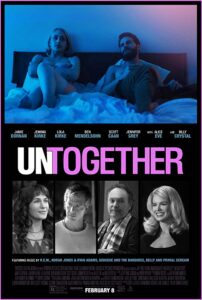Novelist Emma Forrest’s meandering directing debut packs genuine emotional punch.


Writers are miserable people. Films about them often fail to understand their subjects. My favorite of the narrow writer sub-genre has to be Curtis Hanson’s “Wonder Boys,” followed, of course, by Spike Jonze’s “Adaptation.” Capturing the frustrating, insular activity of putting words on the page requires that the filmmaker understand the mentality of the writer. Demonstrating that it takes one to know one, with “Untogether,” writer/director Forrest clearly shows an empathetic grasp on the material.

An ensemble drama, the film has one-time novelist Andrea (Jemima Kirke) trading her alcohol and drug addiction for a new infatuation with Nick (“Fifty Shades’” Jamie Dornan), a doctor, whose wartime memoir has become a bestseller. Andrea is living with her sister Tara (Lola Kirke, real-life sister of Jemima) and her sister’s older boyfriend Martin (Ben Mendelsohn), an insecure, aging rock star. When Tara, a message therapist, meets a progressive rabbi, played by Bill Crystal, she begins to question her relationship.

Andrea and Nick’s strained romance unfolds as if in real-time. Nick is coping with new found fame, while still working his day job as a doctor. He’s drinking all the time and leaving a string of one-night stands in his wake. But his encounters with Andrea mean something. The trick is whether he notices.
And Tara’s journey and her relationship with Martin becomes problematic as she pursues a passing infatuation with a rabbi. It’s good to see Crystal in a fully developed supporting role that does not treat him as the comic relief. He’s restrained, authentic, and still very interesting. And look closely, that’s none-other-than Jennifer Grey playing his wife!

Given the level of professional talent, “Untogether” doesn’t really qualify as part of the mumblecore school. However, the narrative clearly owes a debt to that style of story-telling, as the events unfold and come to a close in meandering fashion, finding and exploring themes as they evolve. The low-budget mumblecore films are marked by improvisational dialogue making use of untrained talent. Great examples are Andrew Bujalski’s “Mutual Appreciation” and his “Funny Ha Ha.” I’ve heard viewers call these type films the “so what” narrative. And while many unfocused movies deserve that designation, “Untogether” manages to avoid the monotonous “so what” moniker.
Regardless of Forrest’s cinematic influences, she has a handle on her theme and message. Writing is a messy business, which takes its toll on the writer and those around him or her. In today’s environment, no one seems to have time to be sensitive and methodical. Great writing often gets lost in the 24 hour social media cycle. And into the character of Andrea, Forrest presumably projects a bit of herself and her life experience. A novelist, Forrest knows Andrea inside and out, and this is why above all “Untogether” has relatable connective tissue. Writers should identify with Andrea and understand why Nick is struggling with some kind of mounting guilt.
Thoughtful and introspective, “Untogether” is a solid directing start for writer Emma Forrest, who should continue the cathartic exploration of the world that she knows intimately.
